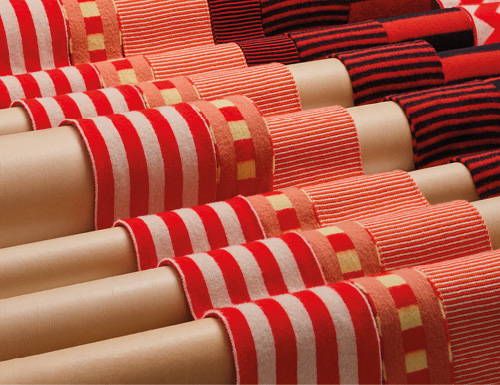

Sustainability
We believe in the importance of sustainability in every aspect of our business. The following initiatives highlight our dedication to sustainability, ethical practices, environmental stewardship, and social responsibility.
A naturally regenerative and circular material
Lambswool is a naturally regenerative material, sourced from sheep that regrow their fleece annually. As a biodegradable fibre, it is fully compostable, breaking down naturally at the end of its life without harming the environment. It is also recyclable, allowing garments to be reprocessed into new products or used in different applications. Lambswool is a naturally circular material, supporting sustainable practices by reducing waste and returning to nature in a closed-loop system.
Manufactured mostly in Scotland and entirely within the UK
All our knitwear is proudly manufactured mostly in Scotland and entirely within the UK, with both yarn spinning and knitting taking place at local mills. This reduces the carbon footprint associated with long-distance transport, contributing to a more sustainable production process. By keeping our supply chain local, we support the local economy while minimising environmental impact. In addition, workers in the UK benefit from strict employment laws that safeguard their rights, health, and wellbeing. These laws ensure fair wages, safe working conditions, and protections against exploitation, making our production not only environmentally responsible but also ethically sound.
Responsible Wool Standard (RWS)
We source our yarn from a state-of-the-art mill accredited with the Responsible Wool Standard (RWS), a voluntary standard designed to improve the welfare of sheep and protect the land they graze on. The RWS certifies the entire wool supply chain, from farms to final business-to-business transactions. RWS criteria include strict animal welfare guidelines that prohibit harmful practices like mulesing, as well as progressive land management practices to protect soil health, biodiversity, and native species. Additionally, the standard ensures social welfare, fair working conditions, and worker safety. We're proud to support this commitment to responsible sourcing.
Global Organic Textile Standard (GOTS)
The dyes and chemicals used in all our wool production meet the Global Organic Textile Standard (GOTS), which is a leading international certification for textiles made from organic fibres. It ensures that all our yarn meets strict environmental and social criteria. This means that the yarn used is dyed and processed with environmentally friendly chemicals, ensuring sustainability while safeguarding workers' welfare.
Responsible Packaging
In our wholesale operation, each knitwear item is individually packaged in recyclable or compostable clear bags to ensure product protection during transit. Wholesale orders are shipped in durable cardboard boxes made from recycled materials. These boxes are fully recyclable and designed to minimise waste. We encourage our retail partners to reuse or recycle all packaging materials after use. All online shop orders are hand-wrapped using recyclable paper packaging. No plastic or non-recyclable materials are used in this process. Wherever possible, we aim to reduce unnecessary packaging while ensuring that orders are securely packed for safe delivery. We strive to keep packaging minimal, thoughtful, and in alignment with our sustainable values.
Becoming Carbon Neutral
Our next challenge, and something we are actively working on, is becoming a carbon-neutral company, and this is where our attention now lies.
Our initial step will be to assess the carbon footprint of our products throughout their entire lifecycle—covering wool production, processing and spinning, garment manufacturing, transportation, product usage, and end-of-life disposal or recycling. Conducting a comprehensive life cycle assessment will provide valuable insights, helping us pinpoint areas for improvement and prioritise actions that yield the most significant environmental benefits.
In addition to measuring emissions, we hope to record the environmental advantages of wool farming, particularly its role in carbon sequestration. Sustainable grazing practices can enhance soil health and vegetation, thereby increasing CO2 absorption from the atmosphere. By quantifying these benefits, we may learn that our environmental credentials are stronger than we currently realise.
From there, we will collaborate with our supply chain to address key hotspots and begin tackling our residual carbon emissions by investing in projects that actively sequester carbon from the atmosphere.
As we move forward, our commitment to sustainability will continue to evolve. We are dedicated to not only meeting but exceeding industry standards, ensuring that our practices reflect our values and contribute positively to the planet.
